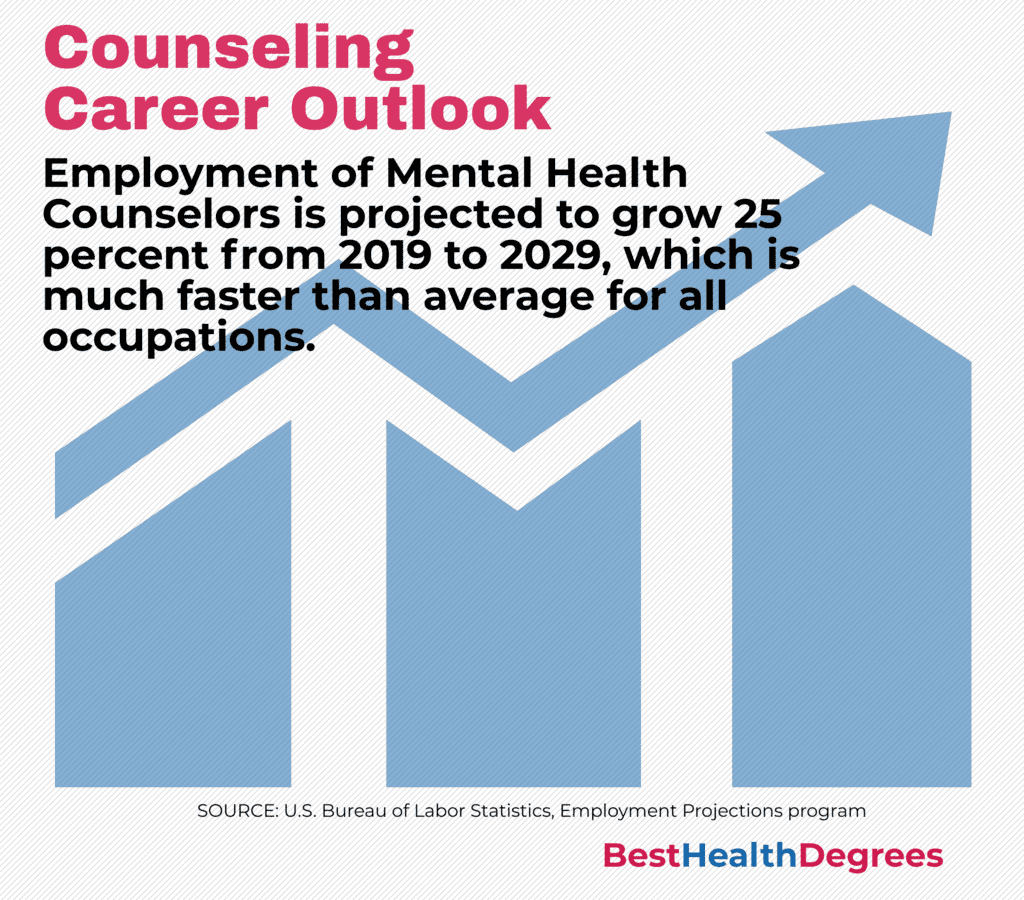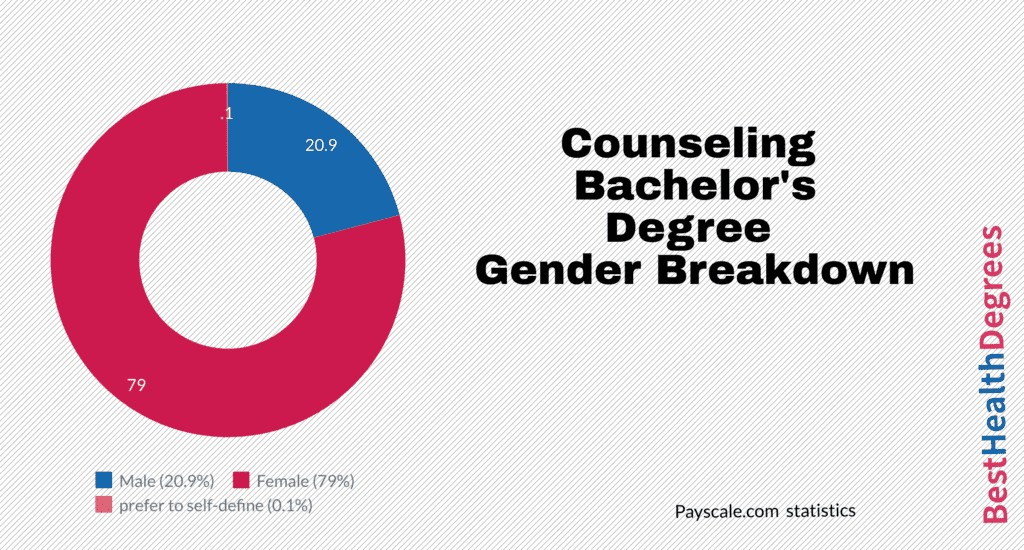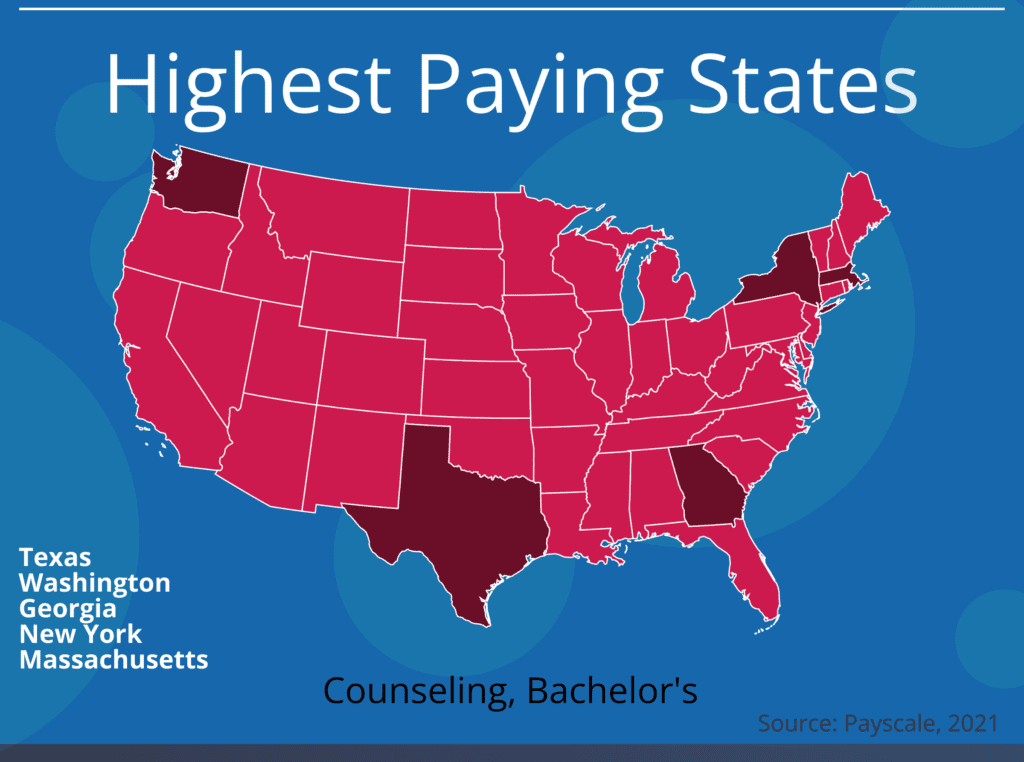Key Takeaways:
- Best counseling degrees often lead to careers in areas such as school counseling, mental health counseling, and substance abuse counseling.
- Accreditation from bodies like CACREP is emphasized for ensuring the quality and recognition of the degree.
- Practical experiences, like internships, are highlighted as crucial for gaining real-world skills during the program.
The best types of Counseling degrees train counselors to provide guidance, healing, advice, and other help to people in need. These mental health professionals offer mental health services, addiction counseling, and many other services. Those wondering how to become a counselor will find several paths to that goal.
Sometimes, the word counseling may not even appear in the degree type. For example, suppose someone were to ask how to become a therapist or counselor. In that case, they might find that the best path to either of those job titles will come through a psychology, sociology, education, human services, or social work degree.
How to Become a Counselor
Counseling isn’t just one thing. The different methods of utilizing the skills gained from a counseling degree program can play a role in several professions. There are degrees in counseling, minors, and also specializations. Ans a specialization offers many career choices for those who want to work as a counselor.
In addition, some take paths that aren’t always the most typical. To become a therapist or counselor many individuals use their undergraduate degree as a stepping stone for graduate-level careers. A psychologist and an administrator in a related field are common career paths.
Counseling Specializations
Counseling roles vary greatly by location, population, and sometimes medium. When thinking about specialization, applicants should consider what they’re passionate about. For example, counseling children in elementary schools using art therapy is a specific area, population, and technique. Furthermore, this enables professionals to choose different therapy careers during their working life.
Below are some common counseling positions and jobs.
- Alcohol and Drug Counselor / Alcohol and Drug Counselors
- Mental Health Counselor / Mental Health Counselors
- School Counselor / School Counselors School Psychologists
- Grief Counselor / Grief Counselors
- Behavioral Disorder Counselor / Behavioral Disorder Counselors
- Rehabilitation Counselor / Rehabilitation Counselors
- Career Counselor / Career Counselors
- School Psychologist / School Psychologists
- Addiction Counselor / Addiction Counselors
- Child Abuse Counselor / Child Abuse Counselors
The list goes on. This means applicants who want to know how to become a counselor would do well to figure out precisely what type of counseling they want to pursue. They can find the right degree type and programs to help them achieve their goals.
What Degree Do Counselors Need?
A student may find they want to approach professional counseling through social work rather than mental health or therapy. Perhaps the applicant wants to work in family or marriage counseling or conflict management. With so many career paths, applicants need to keep to their goals and go for the thing that moves them the most.
What Are the Best Counseling Degree Schools and Programs?
Finding the best counseling degree schools or programs will involve looking for those aspects that make education worthwhile. It’s not just about what the school or program offers regarding education, but also what they offer graduates going forward. The counseling program accreditation is the main criteria to look for when deciding on a school or program.
Accreditation
Multiple types of accreditations exist, as do multiple accrediting bodies. For those looking for the best education and a degree that will have recognition in the real world, it’s essential to look for accreditation from regional and specialized counseling programs.
Regional accreditation comes from accrediting groups sanctioned by the US Department of Education or the federally backed Council for Higher Education Accreditation (CHEA). This type of accreditation covers a college or university as a whole. It is proof that the school meets the educational standards set by the group that accredits it and the CHEA or US Dept. of Education.
Specialized accreditation typically comes from sanctioned groups that operate within a specific industry. And it usually applies to the program or curriculum specifically. For counseling programs, several specialized accreditation groups exist, but two of them have the most recognition:
- Council for Accreditation of Counseling & Related Programs (CACREP)
- American Psychological Association (APA)
Accrediting Bodies
When looking for the best counseling degree programs or the best-accredited school counseling programs online, it’s a good idea to look for counseling program accreditation from one of these groups. However, when it comes to CACREP vs APA, applicants must do their homework.
The two groups can lead down different paths in this industry. Is CACREP accreditation important? Yes, it’s important, depending on the goals of the student. This also applies to APA accreditation. The CACREP standards tend to lean more toward counseling as the CACREP standards have a high recognition within that industry. The APA standards tend to have a tighter focus on the clinical aspects of the industry.
These aren’t the only two accrediting bodies, and some others with a narrow focus might work better for an applicant’s goals. However, online or offline, choosing the right type of accredited school counseling programs will have a larger impact at the graduate and doctoral levels.
The CACREP vs APA consideration may not be as important for a bachelor’s degree in counseling. Still, applicants who wonder is CACREP accreditation important or if the APA counseling program accreditation standards will work for them should look at what those standards entail.
Some career types prefer one type of accredited degree over the other. Nevertheless, for most entry-level and undergraduate careers, it’s a good idea to make sure the degree has accreditation from one of the two groups.
What Are the Different Counseling Degrees Available?
Counselors must earn a bachelor’s degree as a minimum requirement. Most need a master’s degree to begin their practice. A counseling degree or a therapist degree can come in several different forms and can have different names. A common undergraduate degree for entry-level positions is a bachelor’s degree in psychology or a marriage and family therapist degree.
Beyond that, obtaining a counseling degree and specialization through a certification process is possible. In this way, it’s possible to start with a bachelor’s in counseling but go through something like one of the family counseling certificate programs to work as a family counselor. This process also works with a therapist degree, psychology degree, and other degree types in this field.
A therapist major or counseling major can mean similar things depending on the applicant’s location, the laws regarding practicing these things in that location, licensing requirements, or certification requirements. For these reasons, people seeking a counseling degree or therapist degree should have a concrete idea of their goals. This will help them research what’s necessary for their locale to pursue those goals.
bachelor’s degreeS
To put that in perspective, someone who wants to become a school counselor may find that they need a bachelor’s degree in social work or education, certification from a state-approved program, and post-baccalaureate credits. In such a case, whether the applicant started as a counseling major, therapist major, or related major, they must still fulfill several other requirements.
The additional requirements aren’t always directly tied to the type of counseling degree or therapist degree an applicant holds. This all applies to any career choice someone chooses after they gain a bachelor’s in counseling or another type of degree. The counseling bachelor’s degree will only represent one part of the requirements the applicant must meet.
Master’s Degrees
A master’s degree in counseling takes students 2 to 3 years and includes core courses, elective coursework, hands-on experience, and supervised experience or internships. These master’s programs in counseling can be a MA, MS, or professional studies.
- Master of Science in Counseling
- Master of Arts in Clinical Counseling
- Master of Science in Professional Counseling
Below are some master’s degree topics and classes most students learn in a professional counselor graduate counseling education program.
- Addictions and Substance Use Disorders
- Grief Counseling
- Professional Counseling Orientation
- Career Development
- Ethics Counseling Theories
- Spousal and Child Abuse
- Group Counseling Theory
- Practice Social and Cultural Diversity Issues in Counseling
- Human Sexuality
- Aging and Long-Term Care
- Marriage and Family Therapy
- Crisis and Trauma Counseling
- Tests and Appraisal in Counseling
- Counseling Research Methods
- Diagnostics, Assessment, and Treatment Psychopathology
Specializations for Master’s
The best degree for counseling will likely depend on specialization. There are many specialties so prospective students should research programs before they enroll. Below are some common counseling master’s degree focus areas or specializations.
- Military and Veteran Counseling
- Clinical Rehabilitation Counseling
- Marriage and Family Counseling
- Career Counseling
- Mental Health Counseling
- Organizational Psychology
- Clinical and Counseling Psychologist
- Rehabilitation Counseling
- Community Counseling
- Counseling Psychology in Art Therapy
- Substance Abuse Counseling
Doctoral Degree Programs
Below are some doctoral programs that include doctoral degrees you can earn in counseling.
- PhD in Counseling Psychology
- PhD in Clinical Psychology
- EdD (Doctor of Education) in Counseling Psychology
PsyD in Counseling Psychology
PhD in Marriage and Family Therapy
Someone who wants to pursue a marriage and family therapist degree may want to seek a counseling master’s degree online with a curriculum that caters to that specialization. This is as opposed to seeking an online bachelor’s degree in psychology that doesn’t have a curriculum fully suitable for family counseling or therapy. The type of degree will depend on the curriculum.
Applicants should also pay attention to the counseling major requirements to see if they fit the applicant’s overall goals. Therapist education needed to enter the field can look different from the education needed to enter a different part of this field.
Can You Earn a Counseling Degree Online?
A counseling bachelor’s degree earned online isn’t any different than a degree someone can earn in a traditional setting. For those who wonder what degree I need to be a counselor, there’s no reason they cannot become a counselor online. A counseling degree online works in the same way as any other college for counseling degree.
Counseling major colleges also have an online presence, so it’s possible to pursue online school counseling degrees from the same schools that have regional accreditation with programs similar to those they offer at their physical locations. This includes online psychology counseling degree programs and some of the best mental health programs.
For applicants searching for the most affordable online counseling degrees, it’s a good idea to go through all the steps they would if they were looking at brick-and-mortar school locations. For example, A bachelor of science in psychology online will still require proper accreditation, a good reputation, and a curriculum that fits the applicant’s goals.
Free Online Counseling Classes
Another thing worth looking at is free online counseling classes. Often, these classes come with no credits, but they can help an applicant familiarize themselves with what the degree entails.
What Certifications or Licenses Do I Need to Be a Counselor or Therapist?
All counselors must have a license to practice. Several types of counselor certifications exist. Certification often represents an absolute necessity to practice counseling, and therapist requirements work in the same way. Applicants should look very closely at their state guidelines and the requirements for the specific specialties or niches they want to work in.
However, licensing by state and nationally certified counselor credentials typically only becomes an absolute necessity at the graduate level. As an undergraduate, it’s still possible to earn counselor certification for specific things, in particular, some specialty counseling certifications. For example, some employers may require specific counseling certifications from an institution they choose before you can work with them or while you’re working with them.
For those wondering how to get a counseling certification, it typically requires an applicant to take on additional education hours and pass a test administered by the counselor certification institution. Something like a National Certified Counselor (NCC) credential requires completion of the National Counselor Examination.
Figuring out how to get a counseling certification comes with figuring out the requirements of some of the more prestigious and recognized types of counseling certifications. The NCC, for example, requires a level of education beyond the undergraduate level, so it’s only for those who will pursue further education or those trying to meet therapist requirements in a state with a higher barrier to entry.
A National Certified School Counselor (NCSC) starts with the requirement of having earned the NCC credential. These are things for applicants to keep in mind when they’re planning their career path. They should spend time figuring out which certifications or licenses they will need, which they can obtain, and which they may need to spend more time on their education.
Careers and jobs that don’t require certification or licensing also exist. Applicants do not have to worry that work simply isn’t out there if they don’t have a license or certificate. Still, it would behoove applicants to pick up what credentials they can to help their careers along.
What Types of Careers Are Available for Bachelors in Counseling Majors?
Many careers become available with a bachelor’s in counseling degree. Sometimes, those potential careers exist in sectors outside the field or in service to it. Sometimes, the available careers will depend entirely on the applicant’s state laws regarding the types of therapy and counseling careers they can pursue.
There are many rewarding careers for individuals with a master’s degree or doctoral degree. To get an idea of what types of careers are available, it can help to look at how to become certain types of counselors.
How to Become a Mental Health Counselor
For how to become a mental health counselor, the career path starts with earning an undergraduate degree. A degree in social work, psychology, human services, counseling, sociology, and another bachelor of science degree is a good starting point. However, many states require mental health counselors to have a graduate degree or further education beyond a bachelor’s degree.
A look at any mental health therapist’s job description will typically include precisely what these additional requirements consist of. Still, there are entry-level counseling positions in many places where someone with a bachelor’s degree can start toward becoming a licensed mental health counselor. This is important as experience plays a significant role in these fields. Applicants won’t start with abnormal psychology jobs, but they can certainly gain the education and experience to work up to doing more in this field.
How to Become a Family Counselor
For becoming a family counselor, the rules typically require some form of state licensure and further education beyond the bachelor’s degree. Becoming a family counselor will also depend on what type of career the applicant wants to pursue. There’s a difference between clinical and non-clinical types of therapy careers, and that distinction can also play a role in what’s available in entry-level counseling positions and beyond.
How to Become a Counselor Without a Degree
How to become a counselor without a degree isn’t typically possible. Some types of therapy careers don’t require a related degree but may require a degree, in general, to take on either entry-level counseling positions or non-licensed counseling jobs. Some jobs in the field aren’t precisely types of therapy careers, but they can allow someone to work close to those in the field and gain experience in the process. During that time, it’s essential to gain the education required to officially join the field.
What Kind of Salary Can I Earn with a Bachelor’s in Counseling?
Salary varies a great deal depending on location, education, experience, and various other aspects. The type of counseling work someone does will also play a massive role in salary since the demand for specific specializations can dictate how much public and private institutions are willing to pay for those skills.
How much money does a therapist make? How much do therapists make an hour? Therapist salary, therapist salary per hour, and therapist salary per year can all vary. As an industry overall, the average therapist’s salary sits at around $62k annually.
However, a therapist’s salary only represents one type of salary in this field. Specialization changes things. For example, a family therapist’s salary and a licensed marriage and family therapist’s salary show a median pay of $51.3k. This means half of the family therapist’s salary and licensed marriage and family therapist salary sit below that number, and half sits above it.
Therapists’ salaries, family therapists’ salaries, and licensed marriage and family therapists’ salaries all increase based on the employment industry. Regarding therapist salaries, state government positions tend to pay more. Mental therapist salaries and psychological therapist salaries will also vary similarly.
When considering how much mental health therapists make or how much marriage counselors make an hour, it can also matter to look at private practices. A private practice clinical therapist’s salary can vary widely from what someone can earn from a public facility. State governments tend to pay more, but not all states, and not always.
Highest Paying Careers in Counseling
Some of the higher-paying careers in the counseling field include:
- School counselor
- Career counselor
- Marriage counselor
- Family counselor
- Pediatric counselor
- Geriatric counselor
- Substance abuse counselor
Applicants would do well to cast a wide net when job hunting. Certified counselor’s salary isn’t always easy to pin down. Still, this field has a lot of salary potential for those willing to work toward achieving it.
Are There Any Professional Organizations for Counseling Majors?
Numerous professional organizations exist in this field, and applicants at any level of their journey should seek them out and join when possible. Professional organizations offer education credits, job market opportunities not found elsewhere, workshops, and networking opportunities.
Most counseling, therapy, mental health, and psychology professionals exist within professional organizations. These organizations exist at local, state, national, and even international levels. Professional organizations exist in many colleges and universities, so it’s possible to network while attending a counseling degree program.
Counseling Organizations
There are a tremendous number of counselor organizations besides. As a significant organization that also sets standards, the American Psychological Association is one of the largest professional groups worth considering. This also applies to the National Board for Certified Counselors.
Some of the leading organizations to consider include:
- American Psychological Association (APA)
- National Board for Certified Counselors (NBCC)
- American Mental Health Counselors Association (AMHCA)
- American College Counseling Association (ACCA)
- American Counseling Association (ACA)
Many organizations form around specialties, so it’s worth searching for those that match the applicant’s specialization. For example:
- Association of Guidance Counselors
- Association for Creativity in Counseling
- School Social Worker Association
- School Psychologist Association
- Counselors for Social Justice
The list goes on for these counselor organizations. Many of the larger organizations have branches and divisions dedicated to specializations. The ACA is one such organization with several other divisions. This is one of the reasons why an American Counseling Association membership can do more for a counseling professional.
Some of the publications offered by these groups can give insight into the industry’s expectations of an applicant. A good example of this is the AMHCA Code of Ethics.
Related:
- Best Counseling Bachelor’s Programs
- Best Online Counseling Bachelor’s Programs
- Fastest Online Counseling Bachelor’s Programs
- Best Occupational Safety Bachelor’s Degrees
- Best Online Psychology Bachelor’s Programs
- Most Affordable Online Psychology Bachelor’s Degree Programs
- Best Medical Billing and Coding Degrees
- Best Online Counseling Master’s Programs
- Best Online Psychology Master’s Programs
- Best Public Health Bachelor’s Degrees





